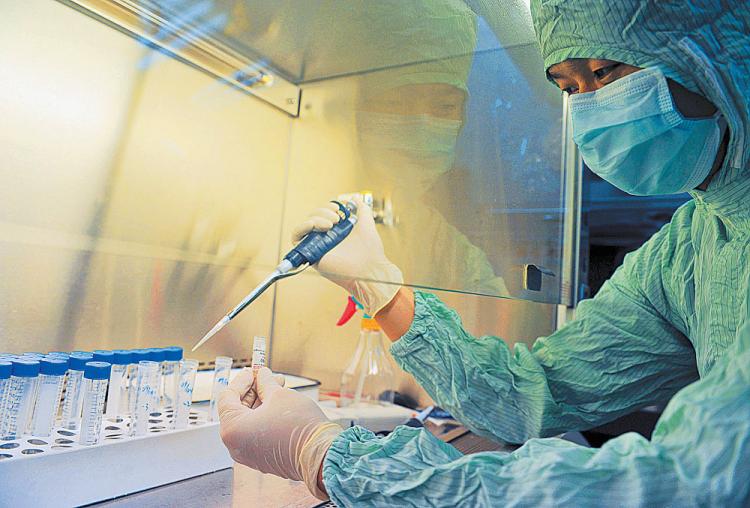 |
||
|
'Our Policy for Confronting the New Flu' |
||
|
FROM THE very first moment that the flu problem became global, the Greek state took all necessary measures for society's protection.
Despite the fact that the situation has caused legitimate concern worldwide, we approach the issue with calm, sobriety and, above all, with planning and strategy. |
 Health Minister Dimitris Avramopoulos |
|
|
In the next few weeks, an increase in the number of incidents is expected in Greece, for which the source of transmission may not be determined. This constitutes a prelude to the wider transmission of the virus through the general population, which is expected within the next few months.
To date, the emphasis in our country has been placed on containing the spread of the virus. From now on, as we enter a new phase of confrontation with the A(H1N1) flu pandemic, one of the main objectives will be the protection of patients with serious illness, as well as high-risk individuals. In this phase, Greece and the rest of the world are tracking individual cases and their contacts differently, using sentinel networks to monitor the flu at the level of the general population. Thus, a realistic picture of the epidemic exists, a picture that will be presented by scientific institutions and the ministry of health, with continued transparency. And this without, however, ceasing to follow-up all cases, for which the World Health Organisation will be continuously informed. Of course, with these methods there is transparency, both at the level of the world community, as well as with the public in Greece. In this manner, we do not overload the hospitals of the national health system with cases that can be healed at home - as is also the case to date, in Greece, for the overwhelming majority of patients. Hospital care will focus, henceforth, on serious incidents so that medical care will be maximised towards frail, high-risk patients. This international practice is followed by all developed countries and is called the mitigation phase, that is: containment of the illness’s consequences. Similarly, diagnostic control for the new virus will deal with, mainly, serious incidents, and its development will be monitored. In addition, in order to avoid the growth of resistance, therapeutic use of antiviral medicines is focused on seriously ill or high-risk patients, while preventive dispensing is limited. In the new phase, the organisation of vaccinations against the virus of the new A(H1N1) flu will play a very important role, ie when the vaccine is distributed and its use approved. Greece will be among the first countries in the world to receive the new vaccine. The vaccine will, as a matter of priority, be granted to individuals at high risk for serious symptoms of the flu, and the more vulnerable groups of the population, especially children of pre-school and school age. The ministry of health and the government as a whole are acting with a sense of high responsibility towards this world threat, taking into consideration the principle of foresight while targeting the effective guarantee of public health in our country. And this occurs in efficient collaboration and coordination with the co-responsible ministries. This is because the efficient confrontation of the pandemic crisis - when and if it expands in our country - is an issue that concerns all government agencies and the whole state. But it also affects each and every one of the citizens of our country, who at a personal and family level must follow faithfully the guidelines of individual hygiene. Despite the present mild form of the illness, the principles of efficient confrontation require readiness even for potentially unfavourable scenarios. For this reason, we have also taken measures for the potential vaccination of the whole population of Greece, provided that the situation forces it and in complete alignment with the scientific community. From a health-hygiene point of view, Greece is a shielded country. We have taken good care so that all citizens feel secure in our country - all residents, all citizens, as well as our millions of visitors. No panic, therefore, but also no complacency. On the contrary, we should be in a constant state of readiness and vigilance. The Greek state has taken its measures. We foresee, schedule, and plan with calm, prudence, transparency and effectiveness. We think and act the way an organised and serious state is obliged to. |
||
| Greek cases double AT LEAST 520 people in Greece have contracted the new H1N1 virus, according to the latest tally by the Hellenic Centre for Infectious Disease Control (Keelpno) in Athens. The number has doubled since last week. Half of all the cases are in Athens. One of the latest victims, and first serious case, is that of a 33-year-old resident of the holiday island of Crete. He is currently being treated at a hospital in Irakleio, where officials said his condition is serious but stable. Concerned the spread of the flu could seriously hurt tourism this year, the government is urging calm. The new flu has not damaged tourism yet, though continuing exaggerations ... would have serious impacts on the tourist industry,” Tourism Minister Kostas Markopoulos told reporters on July 23. |
|
|
|
Meanwhile, officials at the education ministry are reportedly mulling the possibility of postponing the start of the school year.
Furthermore, if the flu spreads as expected this fall, parents may not be quite so willing to send their children to school. |
||
|
(Posting date 30 July 2009)
All articles of Athens News appearing on HCS have been reprinted with permission. |
||
|
||
|
2000 © Hellenic Communication Service, L.L.C. All Rights Reserved. http://www.HellenicComServe.com |
||


